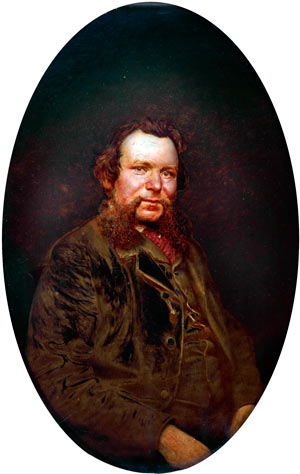I have written previously about the journalist Hugh Shimmin, who was such a vivid observer of Liverpool’s mid-Victorian low-life, and such a committed activist for improved social conditions in the town. Having been granted permission to reproduce the following portrait of Shimmin, I shall say a little more about his life and attitudes, as illustrated by a piece he wrote in 1860 concerning dodgy-doings at the George’s Landing Stage:

Hugh Shimmin (1819-1879) by Richard Norbury. Image by Public Catalogue Foundation. Courtesy National Museums Liverpool.
As appears from the portrait Shimmin had a roughness about him that advertised his humble origins, and a set of whiskers that were exuberant even by mid-Victorian standards. He could be combative, outspoken and intimidating, and he spared no one, high or low, in his denunciations of perceived moral and social failings.
The very Victorian emphasis on abstinence and self-improvement, that is often evident in his journalism, came from real personal experience rather than patrician sanctimony. He was born on the Isle of Man and was apparently brought up in poor circumstances, his father being a stonemason with a drink problem. The family moved first to mainland Whitehaven and then to Liverpool, where Shimmin was apprenticed to a bookbinder at only eight years old. His father died a few years later, thrusting the boy into the role of provider for his mother and younger siblings. Eventually he became manager of the bookbinding workshop, and later bought it out, which put him on the road to ascending the social ladder as a self-made man in the world of books and publishing.
Just how morally disapproving he could be emerges from a short piece Shimmin published in his own periodical, Porcupine, on 15th December 1860. In it he observes the scene on a Sunday evening at the George’s Landing Stage, which in those days fringed the river in front of the George’s Dock (filled in during Edwardian times to be replaced by the monumental Three Graces). He describes the landing stage as being very crowded, owing to the busy ferry traffic transporting folk to the Cheshire shore for their Sunday recreation, and then back home again. He has no gripe with the honest citizens engaging in this pastime, but he has every difficulty with many other persons assembled on the landing stage:
“Young lads and girls who began by going there for a walk,” he writes, “soon made it a meeting-place. Older heads, with more vicious intentions, then began to frequent the stage, and it has gone on from bad to worse, until now it is almost impossible for a female to pass to or from the Ferries without being subjected to the rudeness, vulgarity, obscenity, or profanity of the shameless hordes, of both sexes, who congregate on, and pollute the stage by their presence.”
“The girls who frequent the stage,” he goes on, “and by their gaudy dress, rude speeches, and unseemly conduct, excite the disgust of all well disposed people, are not such as have given themselves up wholly to a dissolute life.” While he might not bracket them as out-and-out prostitutes, he does think that the manner of these girls’ mingling with young men there constitutes a “great public nuisance.” In short, he thinks it an indecent pick-up spot, which can incite the “ruin” of some young girls by “fast young men” who scent “the game of the Landing Stage.” One can imagine Shimmin pacing up and down the boards, growling with disapproval at the goings-on, and one can hardly imagine him going unobserved himself, given his striking personal appearance.
But it is an admirable characteristic of Shimmin’s that he is far from making the “lower orders” his only target in railing at the abuses he sees. “The evil would not have reached such a magnitude,” he maintains, “had it not received more substantial support. On a Sunday evening recently, we noticed men of good position, (one of whom had filled public offices in this town, and had a wife and family at home) leering and chatting with girls, whom they would in daylight, or in the public streets, be ashamed to acknowledge.”
Shimmin singles out (but does not name) “one of our great public men” who has just landed from the Rock Ferry boat: “He appeared to have been wooing the rosy god, or in plainer terms, he was partially intoxicated. He stood a little time by the south refreshment room, gnawing the head of his cane and reeling about now and then, noticing the while the girls that passed, and occasionally tapping some of them on the shoulder or hat. Having completed his resolve, he joined a group, and in a few minutes after was seen talking to a very young girl – a child, or little more – and by the eight o’clock boat this couple crossed to Seacombe.”
Shimmin remarks that “the number of aged men, of decent exterior [his italics] who promenaded and seemed to enjoy the scene was the most suggestive sight. To think of men who will walk to Church with their daughters in the morning, spend the afternoon with their amiable families, and yet devote the evening of the sacred day to the encouragement of such abominable profanity.”
The irony is that Hugh Shimmin himself was just such a man of “decent exterior” as he describes, spending his own Sunday evening away from his suburban villa to take in the “abominable” scene. I don’t seek to impugn his motives or denigrate his sincere efforts toward the betterment of society. But all of us are capable, on occasion, of being unable to define the line that divides our genuine abhorrence from our prurient curiosity.
I am indebted to “Low Life and Moral Improvement in Mid-Victorian England” edited by John K. Walton & Alastair Wilcox (1991) for the biographical information, and also to that publication for its reproduction of Shimmin’s article “Sunday Night on the Landing Stage” (“Porcupine”, 15 December 1860).
